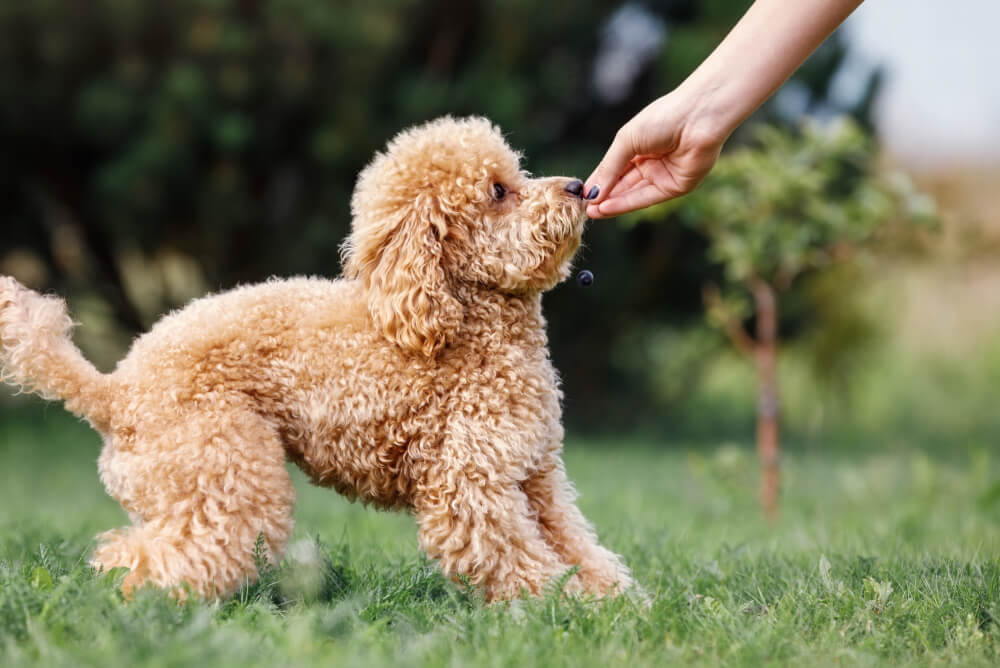
DogFoodAdvisor is reader supported See how
All reviews are 100% impartial but if you buy using links on this page, we may earn a referral fee.
What’s the best dog food for a Poodle?
The best food for a Poodle, like any dog, depends on their age, size, activity level, and any specific dietary requirements or sensitivities they may have. However, here are some general guidelines for choosing the right food for your Poodle.
Look for commercial dog foods that list a high-quality source of animal protein (such as chicken, beef, or fish) as the first ingredient. Avoid foods that contain fillers such as corn, soy, and wheat, as these provide less nutritional value.
Choose a dog food formulated for your Poodle’s life stage: Puppy, adult, or senior. Puppies need more calories and nutrients for growth, while senior dogs may require a diet tailored to their aging needs.
Poodles come in various sizes, from toy to standard. Some brands offer size-specific formulas to cater to the unique needs of each size group. Ensure you select a formula that matches your Poodle’s size.
This breed also benefits from a diet with a moderate to high protein content. Protein is essential for muscle maintenance and overall health. Aim for at least 18-22% protein content for adult Poodles and 22-32% for puppies.
Poodles are an active breed, and require a moderate amount of healthy fats for energy. Look for foods with about 8-15% fat content.
Check the ingredient list and choose foods with minimal additives, artificial preservatives, and artificial colors. Look for natural antioxidants such as vitamin E and C.
Poodles are prone to obesity, so it’s important to feed them the appropriate portion size based on their age, size, and activity level. Follow the feeding guidelines on the dog food packaging and adjust as needed to maintain a healthy weight.
On the list below…
You’ll find The Dog Food Advisor’s best dog and puppy foods for Poodles based on the life stage of your pet. We also make recommendations for the best foods to support specific health conditions that Poodles are prone to as well as foods to suit their pet parent preferences and budgets.
For more information about Poodles, see our Breed page.
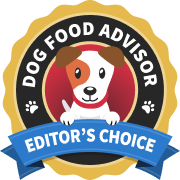
Best Dog Food for Poodles April 2025
Here are The Dog Food Advisor's best dog food brands for Poodles for April 2025.
-
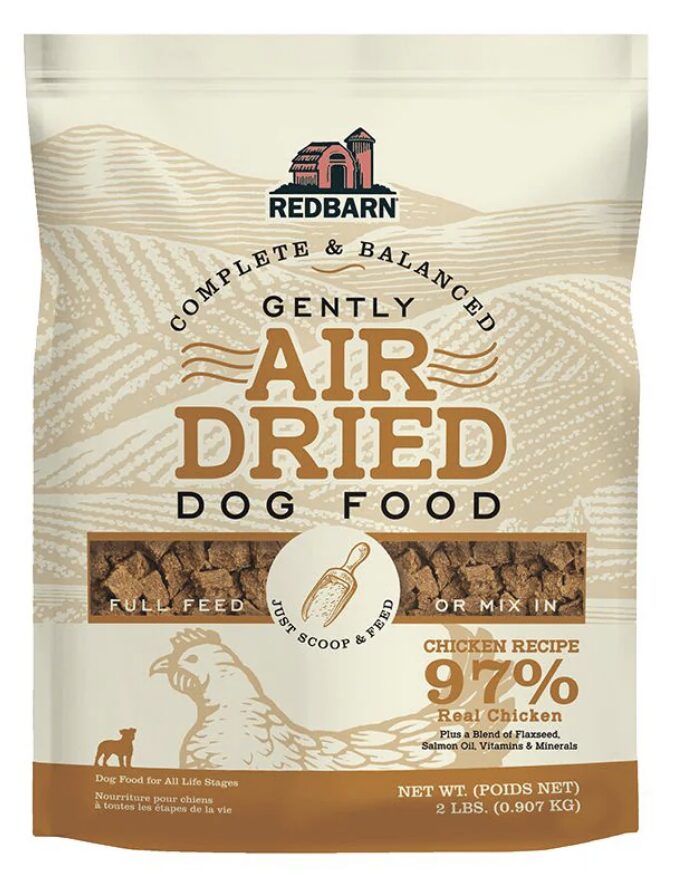
1. Best Dry Dog Food For Poodles: Redbarn Air Dried Chicken Recipe
Air Dried Chicken is one of three recipes analyzed in our review of this product line by Redbarn.
Poodles are active, intelligent dogs with lean muscle needs. Redbarn’s Air-Dried Chicken recipe is made with real chicken as the primary ingredient, providing the quality protein needed for strength, muscle maintenance, and growth. Dry matter label analysis reveals the recipe contains 51% protein, 26% fat and 15% estimated carbs, which creates a fat-to-protein ratio of about 51%.
This high protein food also includes salmon oil and flaxseed which are both rich in omega fatty acids to benefit skin and joint health.
Read our review of the full Redbarn Air Dried Dog Food (Dry) range here
Things we like
- Chicken-based protein
- Salmon oil
- Grain-free and gluten-free
Main Ingredients Chicken, flaxseed, salt, salmon oil, dicalcium phosphate Texture Dry Type Grain-free Protein Percentage 51% AAFCO Standards All Life Stages Best For All poodles Sample buyer review...
Read more buyer reviews at RedBarn.com"Excellent – nice to have a baked kibble option during the summer heat so my pet can graze."
-

2. Best Wet Dog Food For Poodles: We Feed Raw Turkey
Turkey Patty is one of six fresh recipes rated in our review of the We Feed Raw product line.
The first four ingredients are turkey tails, turkey gizzards, turkey wings, and turkey liver. Dry matter label analysis reveals the recipe contains 49% protein, 25% fat creating a fat-to-protein ratio of about 52%.
We Feed Raw Turkey Patty is great for Poodles because it provides a high-protein, easily digestible, and nutrient-rich meal to supports muscle health, a shiny coat, and sustain energy without fillers or artificial ingredients.
Read our review of the full We Feed Raw Dog Food (Raw Frozen) range here
Things we like
- Turkey-based protein
- Human-grade ingredients
- No fillers
Main Ingredients Turkey tails, turkey gizzards, turkey wings, turkey liver, WFR vitamin + mineral mix Texture Wet Type Grain-free Protein Percentage 52% AAFCO Standards All Life Stages Best For All poodles Sample buyer review...
Read more buyer reviews at WeFeedRaw.com"I have been feeding my dogs We Feed Raw for 3 years now and they love their food, their coats are always shining. They are active, happy, healthy dogs."
-
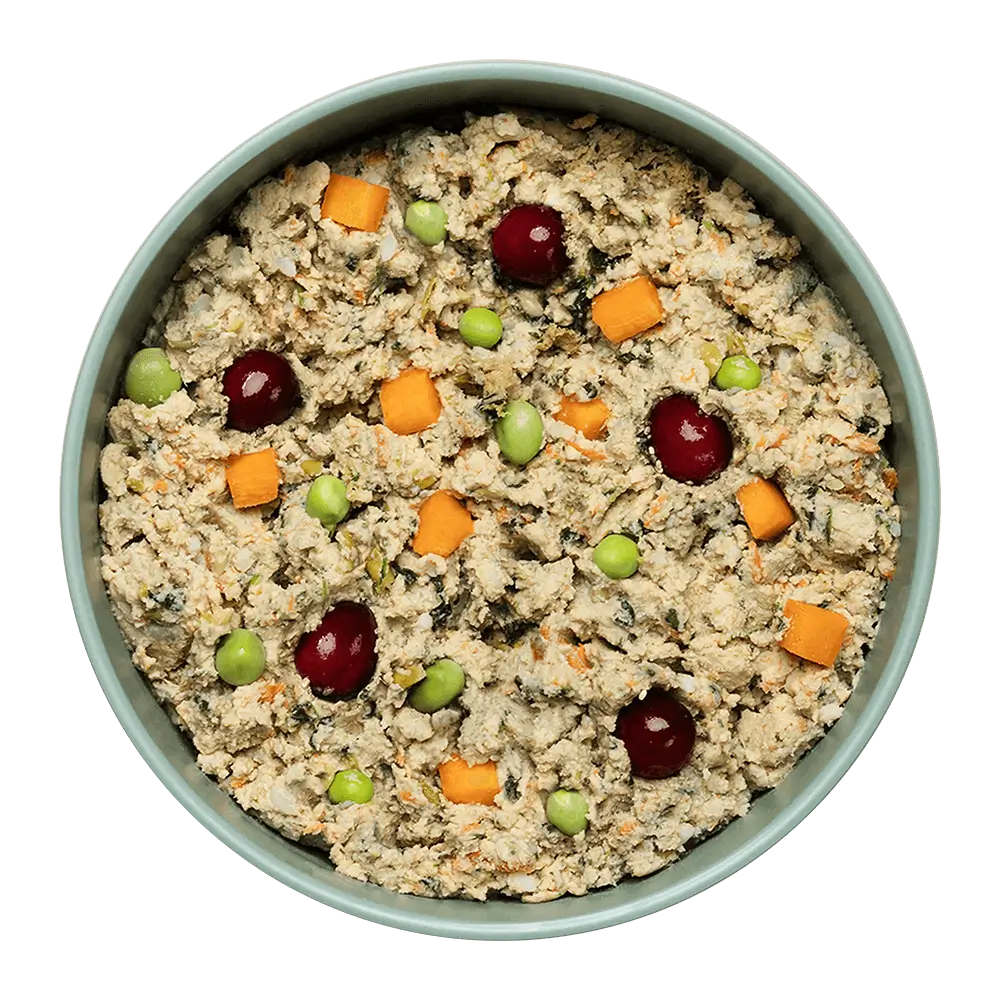
3. Best Fresh Dog Food For Poodles: Ollie Fresh Chicken with Carrots
Ollie Chicken with Carrots is one of four recipes rated in our review of this fresh dog food range.
This recipe derives the majority of its animal protein from fresh chicken. Dry matter label analysis reveals the recipe contains 31% protein, 12% fat and 50% estimated carbs, creating a fat-to-protein ratio of about 38%.
Ollie uses 100% human-grade ingredients, and the protein in this recipe comes primarily from chicken. There’s also fish oil and a wide range of vitamins, minerals and amino acids, plus fruit and veg, for a healthy Poodle.
Read our review of the full Ollie Dog Food Chicken Recipe (Fresh) range here
Things we like
- 100% human-grade ingredients
- Salmon oil for joint health
- Chicken-based protein
Main Ingredients Chicken, rice, carrots, chicken livers, peas Texture Wet Type Grain-free Protein Percentage 31% AAFCO Standards All Life Stages Best For All poodles Sample buyer review...
Read more buyer reviews at Ollie.com"Before Momo ate Ollie, she often times would get sick (diarrhea and vomiting) to the point of having to be rushed to the local emergency vet. We tried prescription dog food the vet recommended, but Momo would not touch it. I tried Ollie on a whim after hearing good reviews from a few friends and it was like Momo’s health issues went away overnight."
-
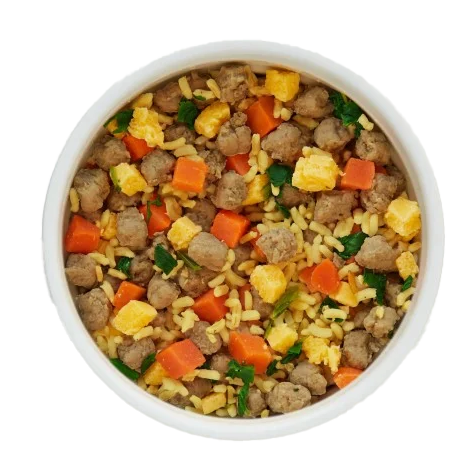
4. The Best Dog Food For Poodle Puppies: Nom Nom Beef Mash
Beef Mash is one of four fresh recipes included in our review of the Nom Nom product line.
This recipe acquires the lion’s share of its meat protein from ground beef. Dry matter label analysis reveals the recipe contains 35% protein, 17% fat and 40% estimated carbs, delivering a fat-to-protein ratio of about 50%.
Nom Nom is known for using whole, fresh ingredients tailored to support a dog’s specific needs. The Beef Mash recipe provides a balanced mix of protein, fiber, and healthy fats, making it ideal for Poodles, especially as they can sometimes have sensitive stomachs or skin.
Nom Nom’s recipes are generally easier for dogs to digest and can be portioned based on your Poodle’s size and activity level.
Read our review of the full Nom Nom Dog Food (Fresh) range here
Things we like
- Includes vitamins
- High protein
- Quality meat
Main Ingredients Ground beef, russet potatoes, eggs, carrots, peas Texture Wet Type Grain-free Protein Percentage 35% AAFCO Standards All Life Stages Best For All poodles Sample buyer review...
Read more buyer reviews at Chewy.com"Our dogs are picky eaters, and we do our best to feed them nutritional food. Nom Nom is excellent."
-

5. Best Affordable Dog Food For Poodles: Canidae All Life Stages Chicken Meal & Rice
Canidae All Stages Chicken Meal & rice is one of six recipes included in our review of the range.
The formula is made with chicken meal as the main ingredient. Dry matter label analysis reveals it contains 28.9% protein, 15% fat and 48.1% estimated carbs, resulting in a fat-to-protein ratio of about 52%.
It also includes a trio of probiotics, antioxidants and omega-3 and omega-6 fatty acids, beneficial for your Poodle’s all-round health and well-being.
Things we like
- Includes Omega-3 and Omega-6 fatty acids
- Protein from chicken meal
- Affordable
Main Ingredients Chicken meal, brown rice, white rice, rice bran, cracked pearled barley, peas, chicken fat Texture Dry Type Grain-inclusive Protein Percentage 28.9% AAFCO Standards All life stages Best For All poodles Sample buyer review...
Read more buyer reviews at Chewy.com"High quality dog food for a reasonable price. Company seems to have high standards in making their products."
-
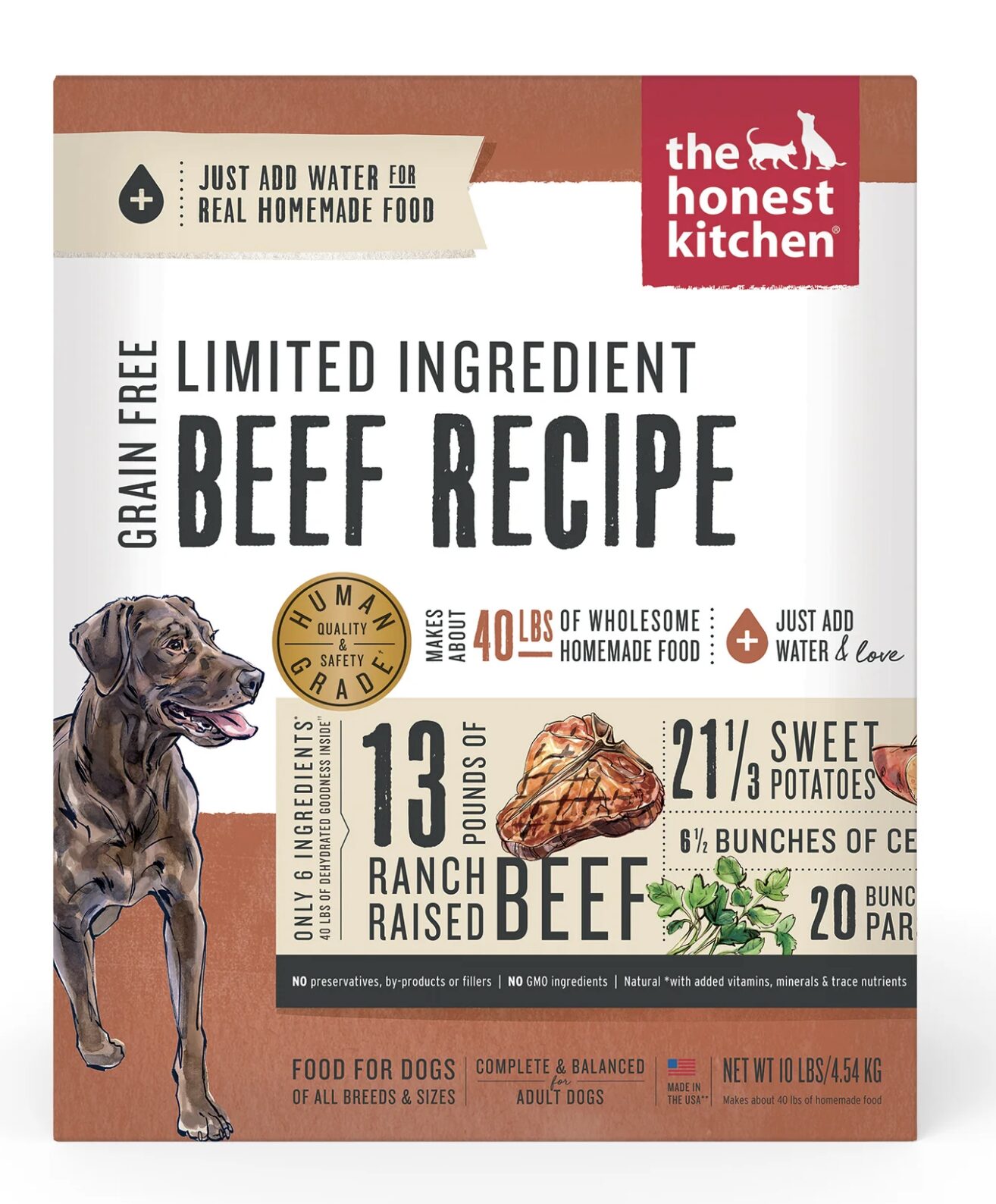
6. Best Dog Food For Poodles With Allergies: The Honest Kitchen Limited Ingredient Beef Recipe
The Honest Kitchen’s Limited Ingredient Grain-Free Beef Recipe is a popular choice for dogs with sensitivities or food allergies.
This formula uses just six main ingredients, with beef as the primary protein source, making it a simpler option for dogs who may react to certain ingredients. Since Poodles can be prone to sensitive stomachs or allergies, a limited-ingredient diet like this one can help minimize potential triggers.
Our dry matter label analysis reveals the recipe contains 27.2% protein, 7.8% fat and 57% estimated carbs, resulting in a fat-to-protein ratio of about 29%.
If you’re looking for a wholesome, minimally processed option that still provides balanced nutrition for your Poodle, this food would be a good choice.
Things we like
- Human-grade ingredients
- Beef protein with essential amino acids
- Low fat content
Main Ingredients Dehydrated beef, dried chickpeas, dehydrated sweet potatoes, dehydrated parsnips, dehydrated celery, dried parsley Texture Wet Type Grain-free Protein Percentage 27.2% AAFCO Standards All life stages Best For All poodles Sample buyer review...
Read more buyer reviews at Thehonestkitchen.com"My dog, a 6yr old, has had stomach issues for years. I finally had her Nutriscan tested for sensitivities, and her food (even the prescription food she was on) was the issue. We had to find a very limited ingredient food and this for the bill perfectly! She loves it and it seems to fill her up better than her old food."
-
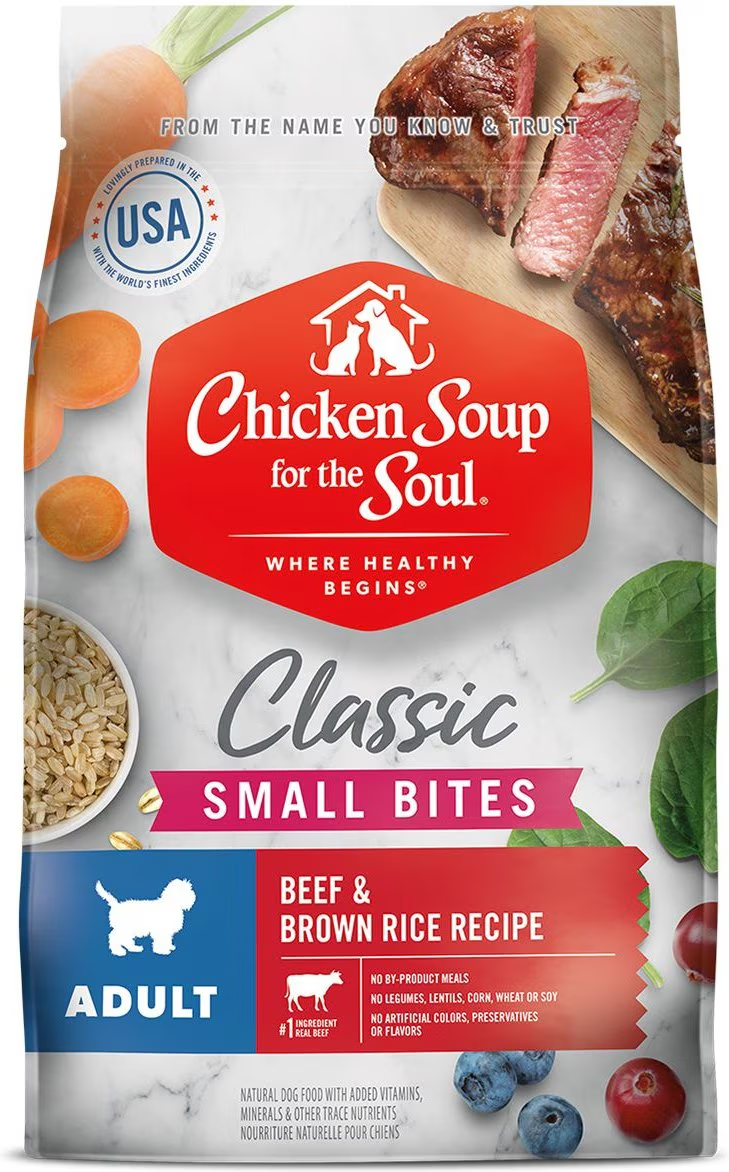
7. The Best Grain Inclusive Dog Food For Poodles: Chicken Soup for the Soul Small Bites Adult Beef & Brown Rice
Chicken Soup for the Soul Adult Small Bites Beef and Brown Rice is a well-rounded dry food formulated for adult dogs, particularly those with smaller mouths, like Poodles.
It features beef as the primary protein source, complemented by wholesome brown rice, which provides a good source of fiber and energy. This combination supports digestive health and keeps energy levels steady, which can be beneficial for active small breeds.
Dry matter label analysis reveals it contains 29% protein, 16% fat and 48% estimated carbs, which produces a fat-to-protein ratio of about 54%.
The recipe also includes superfoods like cranberries, blueberries, and spinach, which add antioxidants to support immune health. It’s free from by-products, corn, wheat, and soy, which is helpful for dogs with sensitivities to these fillers.
Overall, this food could be a great fit if you’re looking for a nutritionally balanced, smaller kibble that’s easier for your Poodle to chew and digest while providing quality ingredients for everyday health.
Read our review of the full Chicken Soup for the Soul Dog Food (Dry) range here
Things we like
- Includes prebiotic fiber
- Superfoods
- Omega-3 and Omega-6 fatty acids
Main Ingredients Beef, turkey, turkey meal, beef meal, pearled barley Texture Dry Type Grain-inclusive Protein Percentage 29% AAFCO Standards Maintenance Best For Adult poodles only Sample buyer review...
Read more buyer reviews at Chewy.com"I have finally found a food that my pup actually LOVES! He is a part of the family so I needed something that was healthy and also easy to eat, since he is only 10 lbs. This is the one! "
More Top Picks
To view more top dog foods by category… click the link below that best meets your personal feeding needs.
Poodles originated in Germany, where they were initially bred as water retrievers for hunting. Their distinctive grooming style served a practical purpose in the past, as it allowed for buoyancy in the water while protecting vital organs. Today, the grooming style is often done for aesthetic reasons.
Poodles have consistently been a popular breed in the United States for many years. They are known for their intelligence, versatility, and distinctive appearance, which has contributed to their enduring popularity. Poodles often rank among the top 10 most popular dog breeds in the USA based on registration statistics from organizations like the American Kennel Club (AKC).
Here are the most frequently asked questions we get about Poodles:
Frequently Asked Questions
What do Poodles look like?
Poodles are known for their unique, curly or corded coat, which is hypoallergenic and sheds very little. However, their curly coat requires regular grooming to prevent matting. They come in three size varieties:
- Standard Poodle: Over 15 inches tall at the shoulder
- Miniature Poodle: 10 to 15 inches tall at the shoulder
- Toy Poodle: Under 10 inches tall at the shoulder
How much exercise does a Poodle need?
The amount of exercise a Poodle needs can vary depending on their age, size, and individual energy level. Poodles are an active breed, and they generally require a moderate to high level of exercise to stay healthy and happy. Here are some guidelines for how much exercise different Poodle sizes typically need:
- Standard Poodle: Standard Poodles are the largest of the Poodle varieties and are quite active. They typically need at least 60-90 minutes of exercise per day. This can include brisk walks, jogging, playtime in a fenced yard, and mentally stimulating activities like obedience training or agility.
- Miniature Poodle: Miniature Poodles are smaller than Standard Poodles but still have plenty of energy. They usually require around 30-60 minutes of exercise each day, which can include walks, playtime, and training sessions.
- Toy Poodle: Toy Poodles are the smallest of the Poodle varieties, but they are still active dogs. They generally need about 20-30 minutes of exercise each day. Short walks and indoor play can help meet their exercise needs.
It’s important to remember that Poodles are not just physically active but also highly intelligent dogs. Mental stimulation is just as crucial as physical exercise to keep them engaged and prevent boredom, which can lead to behavioral issues.
In addition to daily exercise, consider engaging your Poodle in interactive play, puzzle toys, and training sessions to challenge their minds. Poodles often excel in dog sports like obedience, agility, and canine games, which can provide both physical exercise and mental stimulation.
What health conditions can affect Poodles?
Poodles are generally a healthy breed, but like all dogs, can be prone to certain health conditions. Responsible breeding practices and regular veterinary care can help minimize the risk. Here are some health conditions that can affect Poodles:
Hip Dysplasia: Hip dysplasia is a hereditary condition where the hip joint doesn’t develop properly, leading to arthritis and pain. Regular check-ups and responsible breeding practices can help reduce the incidence of hip dysplasia.
Progressive Retinal Atrophy (PRA): PRA is an inherited eye disorder that causes gradual vision loss and can lead to blindness. Regular eye examinations by a veterinary ophthalmologist can help detect this condition early.
Bloat (Gastric Dilatation-Volvulus or GDV): Poodles, especially the larger Standard Poodles, can be prone to bloat, a life-threatening condition where the stomach fills with gas and twists on itself. This requires immediate veterinary attention.
Epilepsy: Epilepsy can occur in Poodles and is characterized by seizures. Medication can often manage this condition, but it requires veterinary care and monitoring.
Skin Issues: Poodles’ dense, curly coats can make them prone to skin conditions like allergies, hot spots, and dermatitis. Proper grooming and regular skin checks can help prevent and manage these issues.
Ear Infections: Poodles’ floppy ears can trap moisture and lead to ear infections. Regular cleaning and inspection of the ears can help prevent infections.
Heart Disease: Some Poodles can develop heart issues, including mitral valve disease. Regular veterinary check-ups can detect heart problems early.
Hypothyroidism: This condition can affect the thyroid gland and lead to symptoms like weight gain, lethargy, and skin problems. It can often be managed with medication.
Addison’s Disease: Also known as hypoadrenocorticism, this condition affects the adrenal glands and can cause symptoms like weakness, vomiting, and diarrhea. It requires lifelong treatment with medication.
Cushing’s Disease: Cushing’s disease, or hyperadrenocorticism, is an endocrine disorder that affects the adrenal glands. It can lead to symptoms such as increased thirst, urination, and a pot-bellied appearance.
Luxating Patella: This condition involves the kneecap (patella) slipping out of place, which can cause lameness and discomfort. In severe cases, surgery may be necessary.
Regular check-ups with a veterinarian, a balanced diet, appropriate exercise, and responsible breeding practices are essential for maintaining the health and well-being of Poodles. If you plan to bring a Poodle into your home, it’s also a good idea to research the breeder’s reputation and ask about health testing for the parents to reduce the risk of genetic health issues.
Final word
The Dog Food Advisor does not accept money, gifts, samples or other incentives in exchange for special consideration in preparing our reviews.
However, we do receive a referral fee from online retailers (like Chewy or Amazon) and from sellers of perishable pet food when readers click over to their websites from ours. This helps cover the cost of operation of our free blog. Thanks for your support.
For more information, please visit our Disclaimer and Disclosure page.








